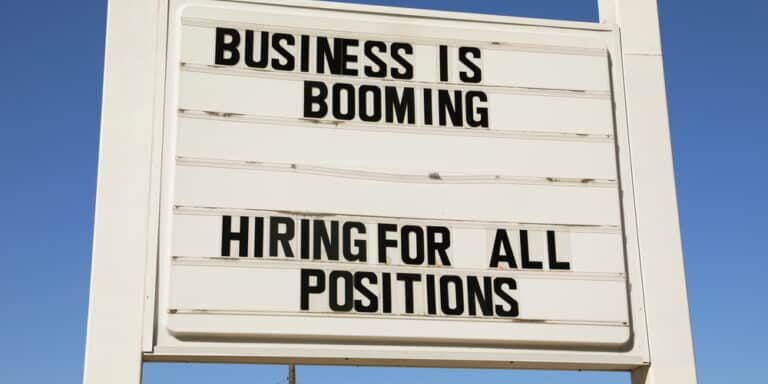
The U.S. Jobs Market: Growth or Crisis?
Private Sector Job Gains Mask a Looming Crisis
The latest ADP report claims the private sector added 183,000 jobs in January—more than expected. At first glance, that sounds like a win. But scratch the surface, and you’ll find a labor market tilting in a dangerous direction.
The real story? America isn’t gaining productive jobs. The bulk of these new positions are in the service sector—restaurant servers, retail clerks, bartenders. Meanwhile, the manufacturing and goods-producing sectors just suffered their worst job losses in two years. A country that stops making things and instead relies on flipping burgers and stocking shelves is on borrowed time.
America’s Shift to a Low-Wage Economy
A strong, competitive economy balances both service and industrial jobs. But the U.S. has been tilting further toward the former, replacing well-paid, skill-based labor with low-wage, high-turnover work. The fastest-growing job categories?
- Restaurant workers
- Baristas
- Retail clerks
- Bartenders
Now, ask yourself: Can a global superpower survive when most of its workforce is pouring coffee and bagging groceries instead of producing essential goods? History suggests the answer is no. When a nation’s economic backbone becomes low-skilled labor, its global influence crumbles.
Corporate Layoffs Signal Deeper Trouble
While service-sector jobs expand, major corporations are slashing their workforce at an alarming pace:
- Forever 21 is considering a second bankruptcy in just five years.
- Estée Lauder is cutting up to 7,000 jobs to prop up its struggling bottom line.
- Walmart is restructuring, eliminating jobs, and quietly shifting its workforce.
This is a clear sign of economic instability. Businesses are struggling under the weight of inflation, high interest rates, and shifting consumer demand. And let’s not forget—when these jobs disappear, they aren’t coming back.
Even Government Jobs Are No Longer Safe
For years, government jobs were seen as recession-proof. Not anymore. The CIA recently announced buyouts for its entire staff—an unprecedented move that suggests even the federal government is being forced to cut costs. If government agencies are downsizing, what does that say about the health of the broader economy?
Trade Deficit: The Silent Job Killer
The U.S. trade deficit just hit a staggering $1.2 trillion. In December alone, imports soared to a record $364.5 billion—proof that America is now almost entirely dependent on foreign-made goods.
For decades, Washington and Wall Street sold us the lie that outsourcing jobs to China, Mexico, and Vietnam was the path to prosperity. But here’s the result:
- Manufacturing jobs gutted
- Skilled labor disappearing
- An economy built on debt and consumption rather than production
Other nations are building their industrial base while the U.S. replaces skilled labor with minimum-wage service jobs. That’s not a recipe for long-term economic survival.
Housing Market Collapse Could Wipe Out More Jobs
The real estate sector, a massive driver of employment, is showing cracks:
- Mortgage applications are down 39% from 2019.
- Home sales are at a 30-year low.
- 71% of real estate agents didn’t close a single deal in 2024.
If this downward trend continues, construction workers, mortgage brokers, and real estate professionals will be the next to face mass layoffs. And let’s be clear—when the housing sector crashes, it drags the rest of the economy down with it.
What Comes Next?
If the U.S. continues down this path, the job market will become even more unstable. Without a resurgence in manufacturing, industrial, and high-skill careers, America will be left with a low-wage, service-based economy that cannot sustain long-term prosperity.
The solution? Individuals must take control of their financial future now. Inflation, bank failures, and layoffs are accelerating—waiting for the government or the Fed to “fix” things is a losing bet.
Bill Brocius has been warning about this for years. His book, End of Banking As You Know It, lays out the roadmap for financial independence in a collapsing economy. Want to know how to protect yourself from the coming storm? Download 7 Steps to Protect Your Account from Bank Failure today—before it’s too late.
🔗 Get your free copy here: 7 Steps to Protect Your Account from Bank Failure











